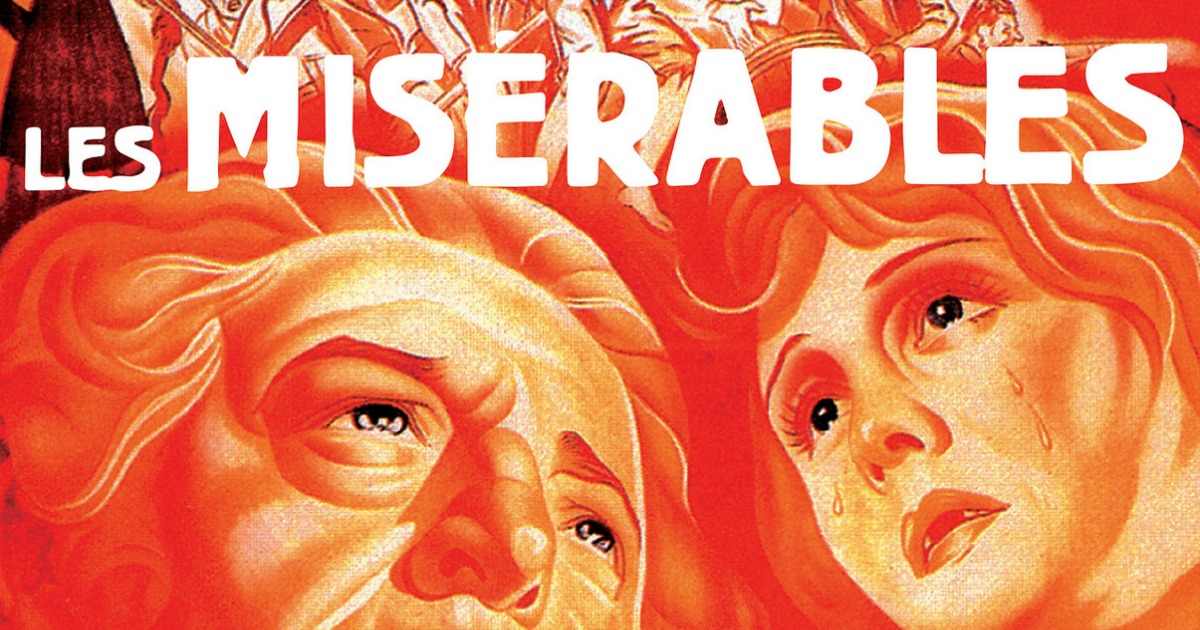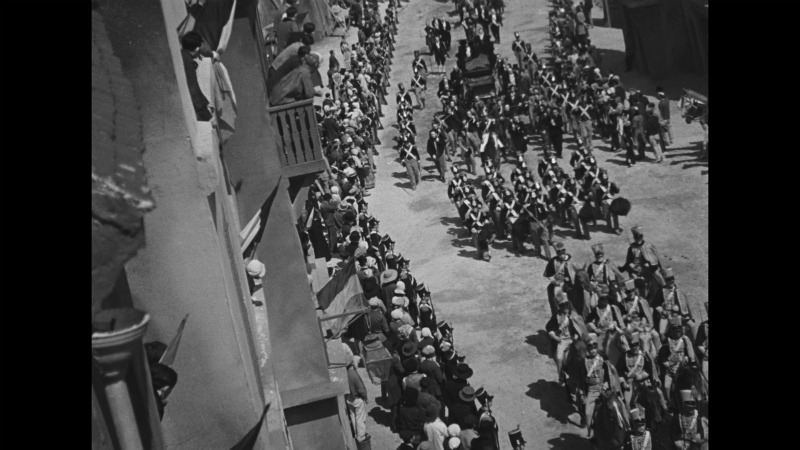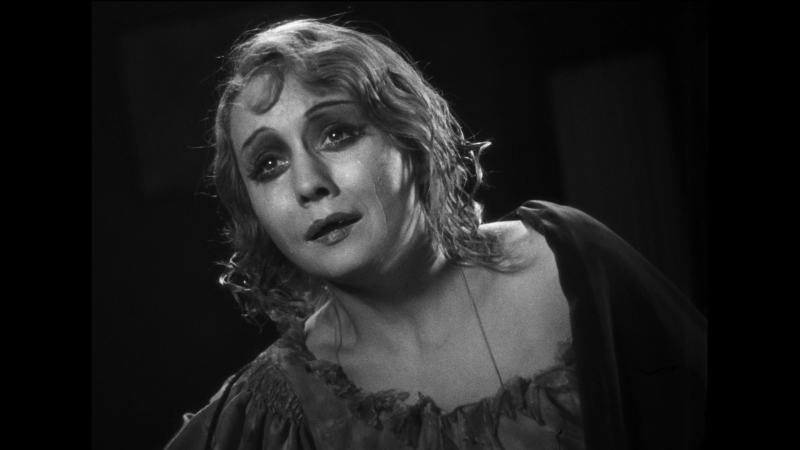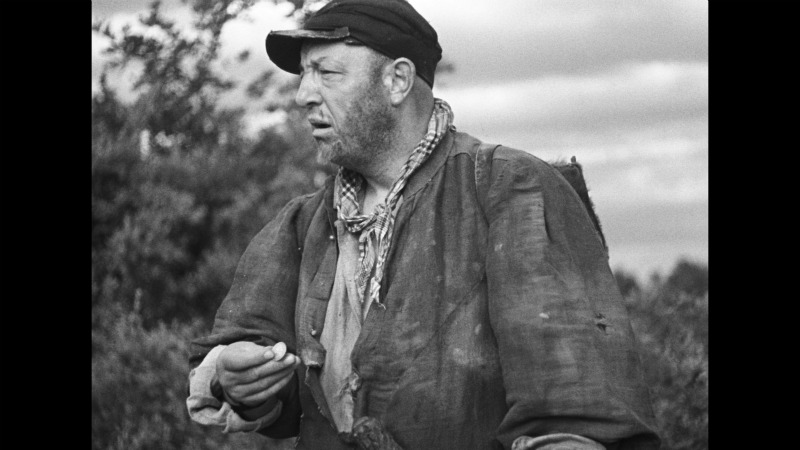
With over fifty filmed adaptations of Victor Hugo’s legendary 1862 novel, Raymond Bernard’s 1934 version (itself three films that add up to one, in the Lord of the Rings fashion) may seem a small entry in a large sea. Indeed, even at the time, his was already the fifteenth screen interpretation, and the fifth mounted in France. The Lumiere brothers, Henri Fescourt, and Albert Capellani (twice) had directed productions of various aspects of the novel. Bernard’s wasn’t even the first to attempt to capture the scope of the novel – its three-film, 280-minute running time was already eclipsed by Fescourt’s mammoth serial version, which runs in total between seven and eight hours (the film is unavailable on DVD, but can reportedly be seen on video in a Paris archive). Yet Bernard’s is considered, now, by many to be the definitive adaptation.
Without having much to compare it to, having only previously experienced the story through Tom Hooper’s hyper-condensed adaptation of the stage musical version, I can only guess why this might be, but the film points forward in a few significant ways towards what Les miserables would come to mean in the popular consciousness. For starters, this was the first sound version of the story, and Bernard uses it in several dynamic ways, not only in situating the audience in the more experiential aspects of the tale, but also in, of all things, inserting musical numbers. I counted at least seven instances, some of which are as simple as a character lightly singing a tune as he or she moves about their day to a full-on chorus announcing their triumph. I wouldn’t go so far as to say this is a musical, but it suggests that either the concept of making Hugo’s work an opera was not so original, or that there is just something inherently musical about the text.

The story has a certain operatic quality to begin with – after being released from prison, where he served a nineteen-year sentence for stealing a loaf of bread, Jean Valjean (played, in Bernard’s, by Harry Baur) commits a series of petty crimes before being set on the righteous path by an eternally-forgiving bishop. Valjean remakes himself many times over the course of a few decades, leading up to the 1832 June Rebellion in Paris, always trying to treat others with the fairness and compassion the bishop taught him. This extends most notably to Javert (Charles Vanel), a police inspector who chases Valjean from town to town, identity to identity, and to Fantine (Florelle) and her family, whose suffering was initiated in Valjean’s name without his knowing. There are inherent Christian themes to it that give virtue to the oppressed, damn the narrow-mindedness of the law, and outright mock the wealthy. The undercurrent of forgiveness and generosity on which Valjean acts is a model of righteousness devoid of ego, and his ongoing struggle to remain good in a world that has deemed him bad is not only reflective of the limitations of freedom, but a roundabout meditation on the nature of original sin. We carry sin with us always, yet must act as though we are free from it.
Bernard seems very much to have been part of that “Tradition of Quality” that defined French cinema before the New Wave, though it anticipates that by quite a few years. The French cinema of the 1930s we see most represented now is defined by the more daring works by Renoir, Vigo, Clair, and Carné. Bernard, in helming an adaptation of beloved novel and trying first and foremost to do justice to it, is on a different wavelength than that crowd, who mostly did original work that was often downbeat, cynical, and sharply satiric, even when it was popular. Which is not to say that Les miserables feels tired; quite the contrary. As much as it feels ahead of its time conceptually, the elaborate quality of the camerawork and sound design makes it feel more like a film from 1944 than 1934. Like Tom Hooper, oddly enough, Bernard employs “Dutch angle” shots quite often, though his ability and inclination to take more time with each shot lets their poetry register as more considered decisions than slapdash circumstance. Cinematographer Jules Kruger (who shot Abel Gance’s Napoleon) lights the scenes beautifully, letting it reflect the Valjean’s goodness or shine through the darkness during the rebellion. Always some sort of inner light perseveres through the horror.

All of this is very well-represented in Masters of Cinema’s new two-disc Blu-ray edition of the three films. Disc one has the first two entries, while disc two has the third as well as all the supplements. They’ve reportedly utilized the same master that Pathé employed in their own Blu-ray edition, released in December of 2013, and the results are fantastic. Contrast is beautifully rendered without losing detail on either end, grain is thick and textured, depth is excellent, and the image retains that filmic look that I prize so greatly in home video releases. We are incredibly lucky that so many of the people overseeing these old films value these qualities. Damage is very minimal, and the image remains stable throughout.
On the supplemental side, look for pretty much the exact same content as the Pathé edition (minus some stills galleries and a few pages in the booklet department), though MoC has provided English-language subtitles throughout where Pathé only had them for the feature. All the content is in French. First and foremost, we get interviews with scholars Claudine Cohen and Raymond Chierat, who provide analysis and historical context for the film. Then, there is an archival interview from the 1970s with Bernard, who discusses his process in casting the film, among other tidbits; screen tests for the role of Gavroche; deleted scenes; Albert Capellini’s 1905 short film The Vagabond, which adapts a scene from the novel; a trailer for the film; and newsreels promoting the film. MoC’s 28-page booklet includes an essay by film scholar Emmanuel Burdeau, which breaks down the legacy of Hugo’s novel and the production of the film, intermingled with critical analysis.

This is a very welcome addition to the MoC family; though on the surface a clone of the French edition, having these supplements available with English subtitles opens them up to a whole new audience. The presentation quality is top-notch, and the supplements provide a wealth of insight into this classic film. It goes for slightly cheaper right now than the French edition, so your mileage may vary on which you prefer if you’re a French speaker, but I’d certainly recommend it in one form or another to those with an interest in early French cinema, as this was about as big as they came in those days. The Lord of the Rings comparison I made at the top is not far off in terms of cultural relevance or impact.



![Bergman Island (The Criterion Collection) [Blu-ray]](https://criterioncast.com/wp-content/uploads/2022/11/bergman-island-the-criterion-collection-blu-ray-400x496.jpg)
![This Is Not a Burial, It’s a Resurrection (The Criterion Collection) [Blu-ray]](https://criterioncast.com/wp-content/uploads/2022/11/this-is-not-a-burial-its-a-resurrection-the-criterion-collection-blu-ray-400x496.jpg)
![Lars von Trier's Europe Trilogy (The Criterion Collection) [The Element of Crime/Epidemic/Europa] [Blu-ray]](https://criterioncast.com/wp-content/uploads/2022/11/lars-von-triers-europe-trilogy-the-criterion-collection-the-element-of-400x496.jpg)
![Imitation of Life (The Criterion Collection) [Blu-ray]](https://criterioncast.com/wp-content/uploads/2022/11/imitation-of-life-the-criterion-collection-blu-ray-400x496.jpg)
![The Adventures of Baron Munchausen (The Criterion Collection) [4K UHD]](https://criterioncast.com/wp-content/uploads/2022/11/the-adventures-of-baron-munchausen-the-criterion-collection-4k-uhd-400x496.jpg)
![Cooley High [Criterion Collection] [Blu-ray] [1975]](https://criterioncast.com/wp-content/uploads/2022/11/cooley-high-criterion-collection-blu-ray-1975-400x496.jpg)